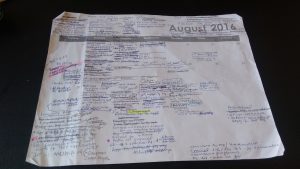We started mapping our commitments over the semester and that’s got me thinking about time / project management and how we learn how to do it. The Chapman Learning Commons offers a toolkit on time management, and UBC’s Wellness Centre has sessions on work/life balance. Your CAP Peer Mentors will have their own ideas to share with you, too.
While I’m no stranger to procrastination or being “busy” vs being productive, over the years I have learned a few tricks that have made it much easier to manage deadlines and Get Stuff Done (GSD). My #1 approach is based on David Allen’s Getting Things Done (GTD): it’s a system in which you capture what you need to do, by categories, break each item into “next actions,” and continuously set, assess, and schedule priorities. The Life Hacker blog here gives an excellent overview of GTD’s key principles, but I’ll list some of the things I’ve taken away from it:
- If it takes less than 2 minutes, do it right away (exception: texting in class!). If not, do it in the scheduled time for that kind of task.
- Have a way to capture what you’ve got to do: keep a notebook or use your phone to jot down things you need to remember. This clears your mind and frees up your mental energy because you aren’t fretting about remembering all this stuff. (It also helps when you are writing papers and come up with brilliant ideas when you’re not at your desk!) Allen says this helps you get to “mind like water.”
- Allen doesn’t like “to do” lists. Instead, he proposes “Next Action” lists: what are the smaller actions you’ll need to take to accomplish a big project? (We’ll talk about this more when we break our summary and lit review assignments into steps that you’ll schedule.)
- Recently I’ve started using the calendar template in Word for my capture system: I print off a calendar page, and write out all the things I need to be doing, by category (e.g., “ASTU” is one category), around the edges of the calendar. Then in the squares for each day, I write down the specific smaller action I will take to move that project along. This works for me because I can keep the big picture always in view, and have a daily plan. If I have extra time on a particular day, I can pull something in off the big list. Carry the list / next actions with you, always. (Some people make theirs using Google Docs so it’s always accessible.)

- Whatever kind of action / to-do list you make, it’s a good idea to schedule your working time (and fun time), and update the action plan at the end of each work session. You’ll know best what you need to do to move things forward when you’ve just finished working on something, rather than the next day when you’re coming back to it.
- Sub-hint: schedule different kinds of tasks for different times of day. What takes the most energy & focus? Do that when you’re the most energetic and focused (e.g., first thing in the morning). Got some menial work to do (e.g., formatting your Works Cited page)? Schedule that for while you’re watching TV. Etc.
Some other things I’ve learned:
- Keep a landing strip for your stuff: park your keys, wallet, etc. in the same place when you get home. Saves you time looking for stuff or saves you forgetting something you need.
- Pack your bag the night before: see above re: not forgetting stuff.
- Find and use scraps of time: think about the things you can do in 5, 10, or 15 minutes, and pull items off your list. Got 5 mins? Review your lecture notes, read a page in a textbook, update your “next actions” list, etc. Those small scraps of time can really add up to a lot of productive time if you’re prepared to use them.
- If you’re stuck, get things going again by taking back control of some other aspect of life: tidy up your desk, fold your laundry, take out the recycling, etc.
- If there is something I’m avoiding, I set a timer for 15 or 20 minutes and make myself start. I can have a treat of some kind once that timer goes off, but not until then. (Sub-hint: make a list of rewards to give yourself!)
What are your tips and tricks for Getting Stuff Done? I hope you’ll add your own suggestions (or questions) in the comments.
